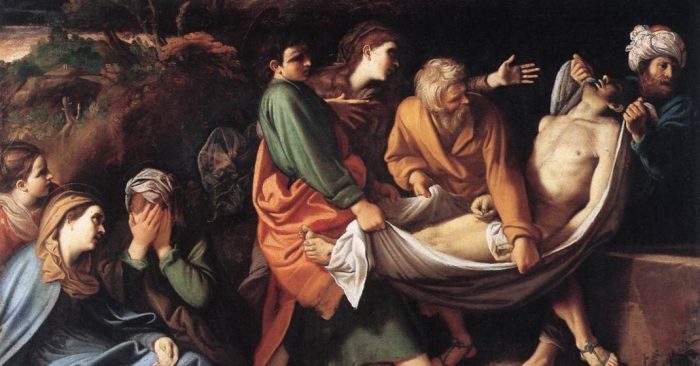4.6 Fraud 1 theory Disciples lied or stole the body

This appears to be the first opposing theory employed by Jesus’ critics. Justin Martyr in a dialogue with Trypho talks about the Jewish leadership still spreading these theories even in his time. “
You have sent chosen and ordained men throughout all the world to proclaim” Trypho stated “that a godless and lawless heresy had sprung from one Jesus, a Galilean deceiver, whom we crucified, but his disciples stole him by night from the tomb, where he was laid when unfastened from the cross, and now deceive men by asserting that he has risen from the dead and ascended to heaven.
Justin Martyr, Dialogue with Trypho, 2nd century
So we know historically the theory was active early on, that the tomb was considered empty.
Eusebius, an early church historian writing in the 4th century, refutes the Conspiracy Theory with this funny story pointing out the absurdity of holding to it: “Let us band together,” the speaker proclaims, “to invent all the miracles and and resurrection appearances which we never saw and let us carry the sham even to death! Why not die for nothing? Why dislike torture and whipping inflicted for no good reason? Let us go out into all the nations and overthrow their institutions and denounce their gods! And even if we don’t convince anybody, at least we’ll have the satisfaction of drawing down on ourselves the punishment for our own deceit.”
This satirical story really shows how silly this theory is. But there are two Fraud theories, so let’s investigate and take this theory critically
Fraud 1 theory Disciples lied or stole the body
1. The disciples claimed to have seen the risen Jesus before them
Their lives were radically transformed by this act, they were willing to suffer torture, imprisonment and martyrdom. These factors indicate sincere belief and we know of no disciples that ever recanted (converted). All historical records point to committedness to the truth until death. Additionally, the disciples were simple, ordinary people. Fishermen, they weren’t brilliant conmen. They had absolutely no material gain by preaching this doctrine, instead they had a great deal to lose. It simply makes no sense that a group of ordinary men with nothing to gain in this world would make up such a story.
2. A mere story by the disciples would not have convinced Paul, who was an enemy of the church
Instead of rejecting the claims Paul was convinced by what he described as seeing the Risen Jesus and was not persuaded to become a Christian by people he was once killing prior to the event.
3. Then there’s James, why would he be convinced?
He may of heard about Jesus’ miracles but we know he was not convinced. He was a pious Jew, the resurrection would seem just another lie to him, like the rest. Think of the Hitchens brothers, Christopher and Peter, completely different worldviews, yet brothers, they could not be more opposed if they tried. What would it take to convince one of them the other was right? Anyway pure modern day, less impactful example. James, like Paul, has been convinced by what he describes as seeing the Risen Jesus
4. It would’ve been James and Pauls favoured theory
Paul and James would have favoured the Fraud theory and gone with the times, but their testimony says they were convinced from holding from this Jewish widespread view by real evidence, seeing the risen Jesus. Very few scholars for the last 200 years have attempted to build a case for such a view.
5. This theory is rejected by every New Testament scholar alive today, including secular ones. It was wrong in Jesus’ day and it’s wrong today
Structured response
- Disciples really believed they had seen the risen Jesus, they were not lying. Scholars agree with this that they believed they saw something
- Paul the church persecutor was convinced based on the appearance of the risen Jesus
- The conversion of the skeptical brother James was convinced based on the appearance of the risen Jesus
- Paul and James would have favoured the fraud theory in their scepticism to Christianity
- Rejected by every New Testament scholar alive, whether sceptic or not
Sources for ‘Fraud 1’
- Early theories — Matthew 28: 11–15.
- Justin Martyr, Dialogue With Trypho, ch. 108, (cf. ch. 17) in A. Roberts, J. Donaldson, and A. C. Coxe, eds. and trans., The Ante-Nicene Fathers: Translations of the Writings of the Fathers Down to A.D. 325 (Oak Harbor, Ore.: Logos Research Systems, 1997).
- Charles Colson — Charles Colson, “An Unholy Hoax? The Authenticity of Christ,” BreakPoint syndicated column 020329, (29 March 2002).
- Very few scholars — Arguably the most recent well-known critical scholar was Hermann Samuel Reimarus (1694–1768) whose works were published posthumously in 1778 by Gotthold Ephraim Lessing (1729–1781).



0 Comments